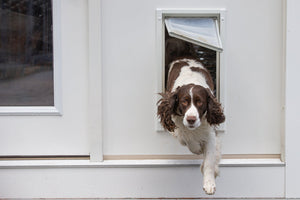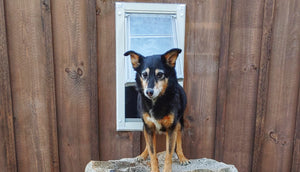Can Dogs Get Poison Ivy?
We all love getting out of the city for the weekend and experiencing the great outdoors. But everyone knows to be careful of poison ivy whenever they are camping or hiking. But if poison ivy is such a significant problem for humans, do we have to worry about our dogs as well?

According to the American Kennel Club, your dog can be affected by poison ivy. However, before you panic over how many times you’ve let your dog run amok through mysterious bushes, please note that while it’s possible, it’s still rare for a dog to experience poison ivy infection.
These infections are non-lethal, and can easily be treated by your veterinarian. Your dog may be prescribed topicalm, injected, or oral steroid medications or antibiotics if there are concerns that a secondary bacterial skin infection will occur.
What Are Some Poison Ivy Symptoms in Dogs
Poison ivy is a non-lethal skin condition, but that does not mean that it won’t be unpleasant for your dog. The symptoms of poison ivy in dogs include:
- Red, swollen skin
- Blisters
- Itching
- Vomiting
- Diarrhea
As always, if your dog’s condition worsens or they experience a significant change in behavior, contact your veterinarian immediately. Your dog may be suffering from a second far more severe infection as well.
Are Some Dog Brees More Prone To Getting Poison Ivy Than Others?
Generally speaking, poison ivy affects all dogs to same. However, there are a few factors that can make it appear as though it affects some breeds of dogs more than others.
Some breeds have certain predilections that make them more prone to having an allergic response, but the biggest factor is most likely your dog’s physical appearance.
Dogs with less thick fur coverage will have more exposed skin that will react to poison ivy when in contact with it. Additionally, dogs who are shorter are more likely to brush their stomachs against the poison ivy, especially if they have bare bellies. And of course, dogs who live more active outdoor lifestyles in heavily wooded areas will also have a higher chance of coming in contact with poison ivy.
How To Protect Your Dog From Poison Ivy
While cases of poison ivy among dogs are rare and often non-serious, it is still best practice to keep your dog away from the plant. Make sure that when you take your dog to a wooded area, you check where they are sniffing to ensure that they are not walking into any poison ivy.
If you notice your dog has made contact with it, wash them off immediately. If you think they are having a reaction to it, take your dog to the vet for an exam. Even if your dog does not have a negative reaction, it does not mean you should let them continue to poke around in poison ivy. Their fur can carry the oils that causes irritation, which can be transmitted to you when you pet them.




